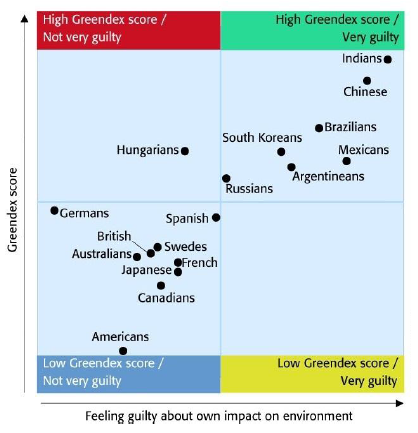It’s developed country, not emerging economy, attitudes that are the problem on sustainability
One of the best sets of data available on attitudes to sustainability around the world is the ‘Greendex’ produced by the polling company Globescan for National Geographic magazine. Its most recent version, published in 2012 (highlights; full pdf), paints a fascinating – and often surprising – picture.
For me, the key headline finding from the survey is all about the gap in perceptions between people in emerging economies and those in developed countries. Despite the fact that emerging economy citizens have much lower per capita consumption levels, the survey found that:
- Emerging economy citizens are substantially more concerned about environmental problems than developed country citizens. The six countries in which most people agree with the statement “I am very concerned about environmental problems” are Mexico, China, Brazil, South Korea (which is a developed country, of course), Argentina, and India. The bottom six (with the least concerned last) are Japan, the US, Germany, Britain, Australia, and (weirdly) Sweden. When prompted about global issues, environmental challenges like climate change, air and water pollution, fresh water shortages, and species and habitat loss all score consistently highly as concerns in emerging economies. In developed countries, on the other hand, consumers are less concerned about the environment and more focused on the economy and the cost of energy and fuel.
- People in emerging economies are much more likely than people in developed countries to say that they feel guilty about their environmental impacts – despite the fact that their per capita environmental impacts are much lower. The countries in which most people agree that they feel guilty about their impacts are India, Mexico, China, Brazil, and Argentina; the lowest scoring are Britain, France, America, Australia, Germany, and (last and least) Japan. Yet when these findings are plotted on the same graph as countries’ actual Greendex score – a measure of the sustainability or unsustainability of their consumption patterns – it emerges that those countries that feel least guilty are in fact those with the highest environmental impacts.
- Emerging economy citizens are far more likely than those in the rich world to agree with the statement that “as a society we will need to consume a lot less to improve the environment for future generations”. The countries that most endorse this view are Mexico, Argentina, Brazil, and China; the US, Australia, Germany, and Japan are least convinced. And even though developed countries are least convinced of the need to consume less, they are also the most sceptical of the view that “people in all countries should have the same standard of living as people in the most wealthy countries”, with Germany, Canada, America, South Korea, and Japan all in the bottom five. (Interestingly, though, Britain and Spain score significantly higher than most other developed countries on both fronts.)
A similar story emerges on the specific issue of climate change. Of the 17 countries covered in the Greendex survey, the six in which most concern is expressed about climate change are Mexico, South Korea, Brazil, Argentina, India, and China, with over 70% of people in each country saying that they are either concerned or very concerned about the issue. Britain, America, and Australia, on the other hand, rank lowest, in every case with less than 45% of people in these two categories.
People in emerging economies are also much more likely to agree that “global warming will worsen my way of life within my own lifetime” than those in developed countries, and to support the statement that “most scientists are convinced that human activity causes climate change and global warming”.


